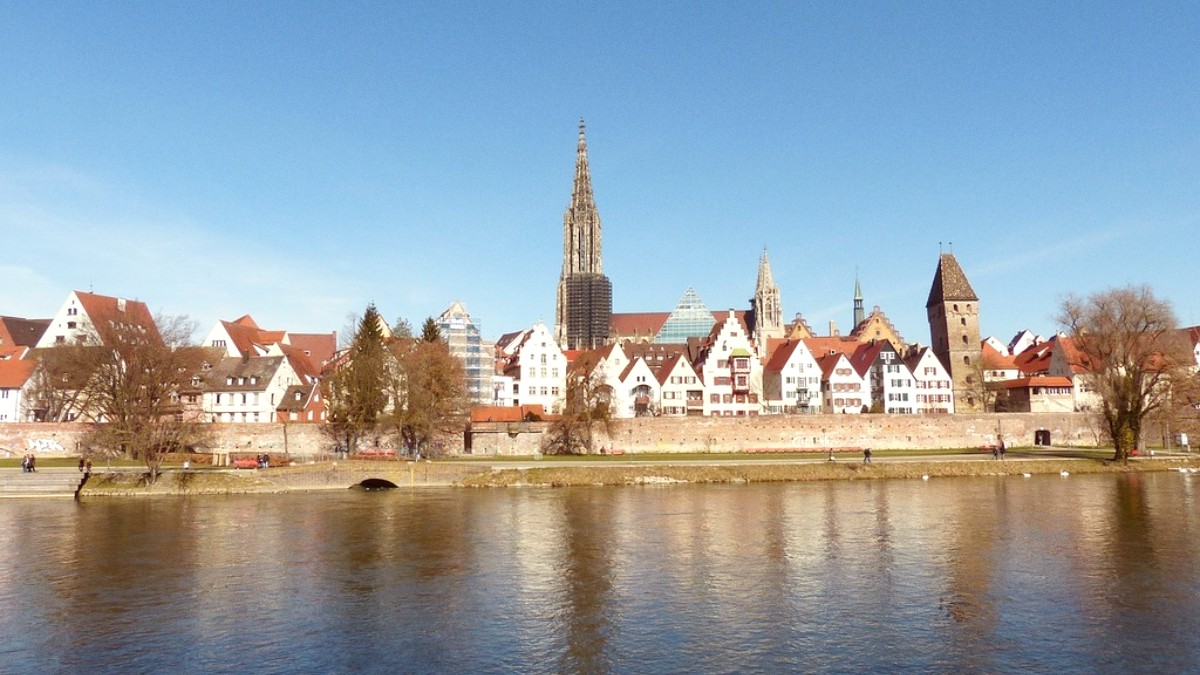
Baden Wurttemberg, Germany
Spring (March-May): Temperatures range from 5°C (41°F) in March, warming to 15°C (59°F) or more by May. The weather is generally pleasant with moderate precipitation, often light rain showers. Humidity levels are typically comfortable. Spring brings blooming flowers and greener landscapes.
Summer (June-August): Ulm's warmest period, with average temperatures between 15°C (59°F) and 25°C (77°F). Temperatures can occasionally climb above 30°C (86°F) during heatwaves. This season sees higher precipitation, often as intense, short thunderstorms, especially in the late afternoon or evening. Humidity can be moderate to high. Despite the rain, summer days are long.
Ulm experiences distinct four seasons. Winters can bring significant snowfall, especially in January and February, which can make walking on untreated paths slippery but creates a beautiful, festive setting.
Summers can have intense thunderstorms, which typically pass quickly but might mean temporary shelter. Always check the local weather forecast before and during your trip.
Warmest Weather, Festivals
Longest daylight hours, numerous outdoor events. Comfortable weather for city exploration.
Higher prices for accommodation and flights. Attractions are more crowded.
Mild Weather, Fewer Crowds
Pleasant temperatures. Prices for accommodation and flights are often more reasonable. Beautiful foliage.
Weather can be variable, with a higher chance of rain. Some outdoor activities might be weather-dependent.
Lowest Prices, Christmas Market
Lowest prices. Fewest crowds at attractions. December presents a special atmosphere with the Ulm Christmas Market.
Cold weather, shorter daylight hours. Some attractions may have reduced operating hours or be closed. Snow and ice can affect travel.
May to September presents the best weather for outdoor activities like cycling along the Danube or hiking in the Swabian Jura.
April to October presents comfortable temperatures for walking and outdoor exploration of the Minster and Fischerviertel.
Late November to December offers the renowned Ulm Christmas Market, a memorable cultural event.
Spring's awakening brings flowers and fresh greenery.
Enjoy the rich hues of autumn foliage in the surrounding landscapes.
Participate in outdoor events and festivals like Schwörwoche during the summer.
Experience a snowy cityscape and cozy atmosphere in winter.
Germany is a member of the Schengen Area, a group of 27 European countries with no passport or other border control at their mutual borders. This means entry rules for Ulm are the same as for any other Schengen country.
Non-EU/EEA/Swiss citizens who do not have a visa-free agreement with the Schengen Area apply for a Schengen visa. This typically includes nationalities from countries like India, China, and many African nations.
Citizens of countries like the United States, Canada, Australia, New Zealand, Japan, South Korea, and others can enter Germany for up to 90 days within any 180-day period without a visa for tourism or business.
Prices in Ulm are typical for a mid-sized German city, presenting options for various travel styles. Consider these strategies to manage costs:
Ulm, and Germany generally, presents a high standard of health and safety for travelers.
No specific vaccinations are needed for entry to Germany. Ensure your routine vaccinations are up-to-date (MMR, Tdap, polio).
For seasonal allergies, pack your usual medication. For colds/flu, practice good hand hygiene with Hand sanitizer. Food hygiene standards are very high, food prepared in restaurants is safe.
Germany presents an excellent, modern healthcare system. Hospitals (Krankenhaus) and pharmacies (Apotheke) are easily accessible in Ulm.
112: Pan-European emergency number for ambulance, fire services, and police. Use for immediate, life-threatening emergencies.
116117: Non-emergency medical on-call service hotline. Use for non-life-threatening but urgent issues outside regular hours.
Ulm is generally a very safe city, with low crime rates. Most visitors experience no issues. Petty crime, like pickpocketing, can occur in crowded tourist areas (Ulm Minster, main train station) and public transport.
Take standard precautions: keep valuables out of sight, use a Money belt, and stay aware of your surroundings.
No specific neighborhoods in Ulm are known for high crime rates or are considered unsafe for tourists.
German roads are generally safe and well-maintained. Natural disaster risks are low. The River Danube can flood, mainly affecting riverside areas. Summers can bring heatwaves. Snow and ice are common in winter.
Flood forecasts are usually well-communicated. Follow general heat safety advice. Wear slip-resistant footwear in winter.
Travel insurance is highly recommended. It covers medical emergencies, trip cancellation, and baggage loss. Insubuy is a great option for medical and travel-related coverage.
| Service | Number | Use Case |
|---|---|---|
| Police/Fire/Ambulance | 112 | Immediate, life-threatening emergencies |
| Non-emergency Medical Hotline | 116117 | Urgent, non-life-threatening medical issues |
| AirHelp | Visit website | Compensation for delayed or canceled flights via AirHelp |